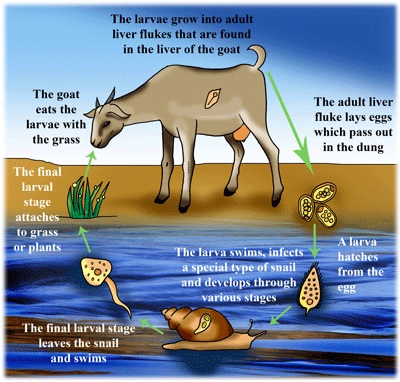Being a biologist, there are very few things that disgust me. When we find road kill, biologists don’t think “oh gross,” or “oh sad,” we think “oooh, can I dissect that?” and then later “what diseases could I catch from dissecting that?” and much later “wow, I didn’t realize the pancreas could get that infested with maggots after being crushed by a tractor trailer.”
You see? Gross. But to me, awesome.
I understand though that other folks who decide to become a dog surfing coach, human scarecrow or professional bridesmaid, might find this sort of thing unappealing.
So this week, I am warning you that things are going to get a little gross. Why? Because I am going to talk about liver flukes, and liver flukes are nasty little parasites. So if something suckling on your bile ducts doesn’t give you heebie jeebies, or if this video of a doctor removing a slippery fluke from an infected patient doesn’t make you want to vomit, then this is the post for you. Others, you have been warned.
Liver flukes are funky little parasites that look a little like a worm with a big ugly sucker for a mouth. They spend about half of their life cycle in fresh water snails, chillin’ out, growing, doing what the snail does. Eventually they leave the snail and encyst (sort of like forming a hardened shell) on grass, and wait for an innocent sheep or cow to come along and consume them. Once in the animal, they burrow through the intestine and find their way to the liver where they consume the tissue and later move to the bile ducts and suckle on those for a bit. Grossed out yet?
From there, they lay eggs which are pooped out, land in a nice watery area and hatch to infect snails again. Once in the snail they chill out, grow, do what the snail does… and the cycle continues.

Now you are probably wondering how having multiple hosts is a good strategy for a parasite. There is so much risk involved in potentially not meeting up with your next home/meal. How does this species not go completely extinct?
To you, I ask: how hard is it to find a snail in a fresh water system? Have you ever had trouble finding one? How hard is it to find a cow or sheep if you were just recently pooped out of one – have you ever known a sheep to travel solo?
Also, if you are a liver fluke, you have the benefit of being able to encyst on grass for long periods while waiting for an animal to chomp you up… and if that doesn’t work, well, your parent produced ~ 25,000 eggs the day you popped out, so the odds are that one of your siblings will make it back to the snail to propagate the species.
Liver flukes are a devastating parasite. They are hard to control and can easily sicken, if not kill an animal. This is sad for the animals themselves, and incredibly bad if you are trying to make a living as a dairy farmer or cowboy. Rather than farming sheep, some folks find themselves farming flukes. Literally.
So why haven’t liver flukes completely taken over the planet? They just might, and this is where climate change comes in, because man, do these animals looooove warm and wet weather. And this is exactly what will be coming to some farming regions in the future.
Over the past 40 years, regions in the UK that have plenty of grazing animals, have seen a massive increase in liver fluke outbreaks, with predictions of full-scale epidemics in the future with a warming climate (1).
Since the flukes love both warm and wet weather, should we pray for drought? Surely the flukes will die off in the hot, dry climate, and climate change may push some regions towards drought conditions.
Sadly, this doesn’t work. In the past, drought years have been followed by even greater fluke outbreaks in the UK, as animals were forced to graze in the areas that stayed wet through the dry spell. The wettest areas are the most heavily fluke-infested, where the encysted flukes are just waiting to get eaten and continue their life cycle.
So milk, cheese and lamb chop lovers beware. If liver flukes become a large epidemic, it will affect the animals, the farmers, the food and eventually you. Unless of course you become vegan, in which case, skip the watercress. Did I forget to mention? People can get liver flukes from eating veggies, too.
Bon appétit!
Further Reading
(1) Predicting Impacts of Climate Change on Fasciola hepatica Risk
Minda Berbeco has a PhD in Biology from Tufts University and is the Policy & Programs Director at the National Center for Science Education. If you did not find this blog disgusting enough, she encourages you to check out this list of human parasites [http://en.wikipedia.org/wiki/List_of_parasites_(human)]. She loves reading about parasites, but even this list made her want to take a shower… until she realized that a lot of them like that sort of thing… sickos.